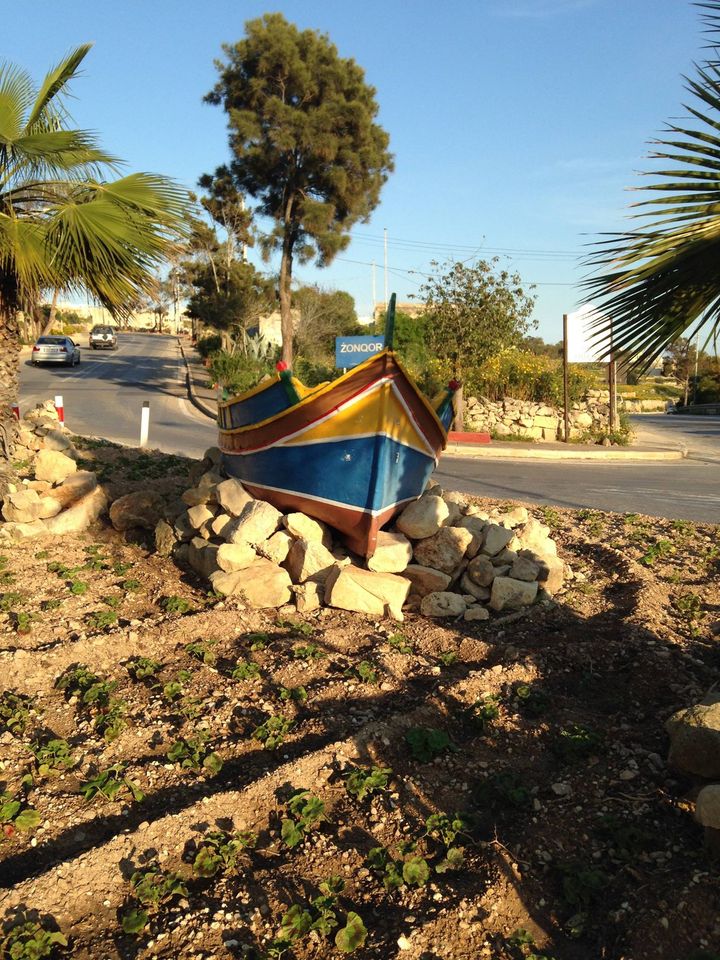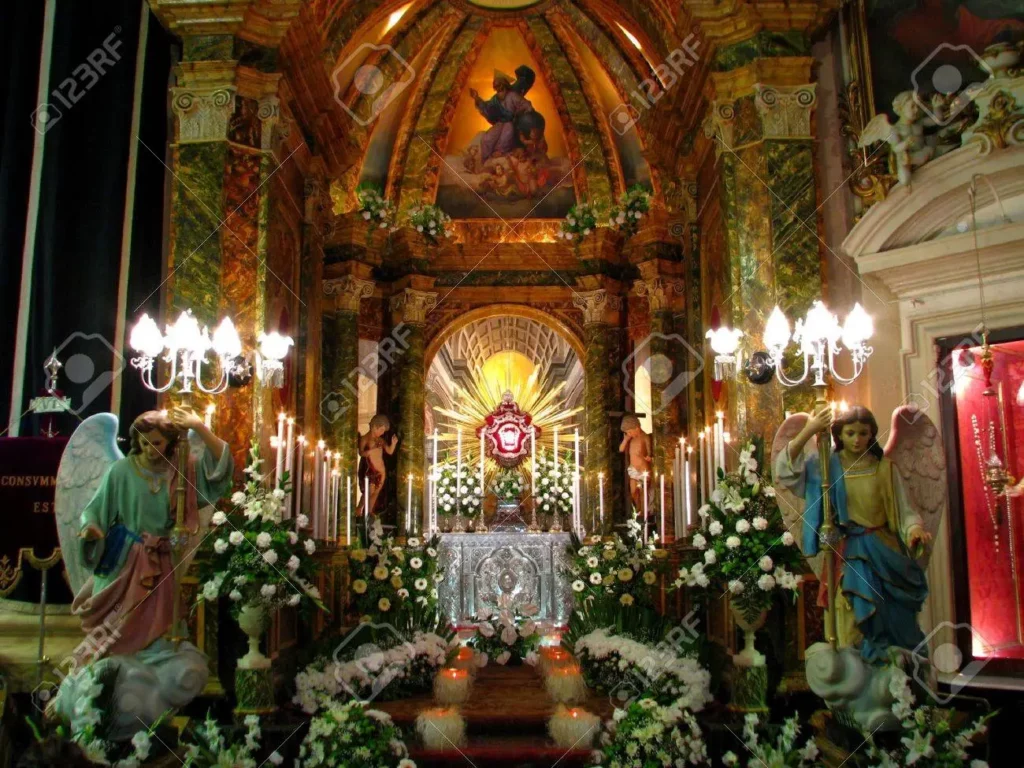- Dr. Herbert Ganado
(originally posted in Facebook, 25th June, 2023)
Before the war Dr. Ganado (1906-1979) was president of the Catholic Action and editor of its newspaper Lehen is-Sewwa. In 1939 he was interned by the British because of my pro-Italian sympathies and later exiled to Uganda.
In the sixties he left the Nationalist Party and founded the Democratic Nationalist Party (DNP), It obtained four seats in a Parliament of 50. ‘In 1966 the Church panicked and advised to vote Nationalist in order to keep Labour in the opposition. So we lost all seats and I withdrew from politics.’
Our first meeting was supposed to take place at the Casino Maltese at 5th May 1973. However, I was not aware that the Casino Maltese was enforcing a strict dress code and I was refused to enter because I was dressed rather informally without a tie and walking on sandals. Dr. Ganado was so sorry. He apologized to me for not informing me before about this and took me to a neighbouring terrace. I think it was Eddie’s Café Regina. Later I got another chance and Dr. Ganado took me, properly dressed for the occasion, finally into the ‘sacred’ Casino Maltese. (During my recent visit to Malta, last April, I went there again, being invited for a wedding reception).
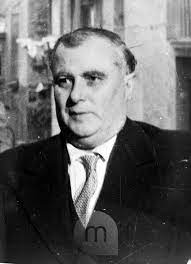
Onderschrift
In his younger years Dr. Ganado had experienced the bishopric of mgr. Caruana, the predecessor of Mgr. Gonzi, who played an important part in the Strickland affair. I was very curious to learn more about this very interesting prelate.
Dr. Ganado was very generous to me. Not only did he grant me several interviews, but he also donated me his books ‘Rajt Malta Tinbidel’. I found them very valuable for my studies. He invited Margreet and me a few times to visit his beautiful home in Floriana.
I found some interesting quotes from this first and later interviews in my research notes.
‘The only thing we have in common with the Arabs is the language.
The British as individuals are nice. The British colonial system is bad.
The Holy See often blundered with respect to Malta. Mgr Casaroli (1914-1998, a highly skilled Vatican diplomat, created Cardinal in 1979; AK) is looking for compromise all over the world. Perhaps this is necessary in countries where the church is a minority. But in Malta we have a majority church, which is rather orthodox. Here there is no need for compromise as in the Eastern bloc, where they have to be glad with everything they obtain in the negotiations.
Bishop Gerada blundered with the Bical Bank, he was too greedy for the 8% interest.
Gonzi used to be uncompromising, now he changed, but so has the Vatican. He would not immediately be backed by them. But if he should really start a fight the Vatican would be forced to back him
Strickland was a good Catholic, but, in his opinion a good Catholic could be anticlerical, which is nonsense. He was an imperialist, a despot and tactless. But he had initiative. He was a kind of Mintoff type, but Mintoff is no imperialist and perhaps more progressive than Strickland. But both were more progressive than this conservative country. Both were educated abroad and they are our only politicians with a foreign policy.
Mizzi was pro-Italian qua language and tradition, liberal, not a fascist. But his link with Italy belonged to the past and that made him a conservative here. For the rest his ideas were quite progressive. Mizzi had some admiration for Mintoff as he quarrelled with Britain. But Mizzi was a man who lived in the past. Tradition was important for him. For Mintoff the past does not count. For his supporters the history of Malta starts with his first government in 1955.’
NOTE: Labour politician Miss Agatha Barbara held the same view as she told me some years later when she received me at the Palace as the first Maltese female President of the Republic.
‘When Mizzi died Mintoff held a sentimental speech in Parliament, his only one.
Manwel Demech (1860-1921) was a forgotten man. Henry Frendo made him alive. Demech was against all authority. He wanted a republic and founded unions. In his time the Church was strict and he was condemned. He had advanced ideas for his time and undermined the establishment.
The 7th June riots of 1919 were caused by many groups, some of them were Demechjani and other Dockyard people. Others were Nationalists who wanted a better Constitution, students and people angry against the wages and prices etcetera.
Demech was the first to fight the Church. Even Mintoff uses some of his phraseology. The Malta Labour Party started as a Catholic party. Now they want to reaffirm their identity by referring to Demech.
Bishop Dom Maurus Caruana (Floriana 1867-1943) was a man of character. His father was in the navy and he was educated by the British Jesuits. He was a Benedictine and Abbot of a Scottish monastery. There the Catholics were a minority. This made him an uncompromising man. As a Bishop elect he drove a motorcycle. He was a good preacher and pro-British. At first he was not popular with the clergy and the monsignors who wanted the bishopric for themselves. They were all Nationalists and he was not. The conservative clergy did not cooperate with him. He was a reformer. He reformed the Church music as he was a lover of good music. The people did not like it, but he was right.
A pontifical high mass presided by Bishop Caruana was more dignified than in the Vatican. Gonzi tries to imitate him.
First Caruana was pro-Strickland, but when Strickland interfered with the Church and a monastery (I suppose Dr. Ganado referred to the Father Carta case; AK) the Benedictine Bishop became angry. When the Church was in danger he was uncompromising. When it came to a fight he fought.
Gonzi was not Strickland’s main opponent, Caruana was.
Bishop Gonzi of Gozo was very unpopular with the British government. When Archbishop Caruana was invited for a government dinner at the palace and could not attend Gonzi replaced him. He was not given the traditional second place for the Archbishop, which was given to the Anglican Bishop of Gibraltar. Gonzi refused to come. His absence was reported by Deputy Governor Sir Harry Luke to the Vatican (but not the reason).
With Governor Lord Gort the British attitude changed towards Gonzi. He realized that without this man we would have starved. Gort persuaded King George VI to give his permission for Gonzi’s nomination as Caruana’s Coadjutor. Caruana was glad as he had asked for this before, but then the British refused. Now Gort ordered Mabel Strickland to support him in the Times of Malta.
In 1942/43 Mabel wrote an editorial in the TOM about the integration of Malta with the United Kingdom. Cardinal Godfrey (in those days apostolic delegate for England, Wales and Malta; AK) talked it out of her head. It might stimulate Protestantism in Malta. So she turned against it when Mintoff took over the idea. That was very brave of her.
Dom Mintoff is a left-wing socialist, but not a communist. He thinks ‘to big’ and commits blackmail when it comes to him. He is against NATO as I wrote in the London Times in 1969 or 1970. He is unpredictable, his ideas are extremely socialistic. He gets close to China and North Korea. He has no religion and never attends important church ceremonies in function. Even the ambassadors of Libya and Israel do! The mobs are his force, that scares people. The English expected a revolt when they left, but the population was afraid.
Integration would have given Mintoff a platform in the House of Commons. Now he wants money and wants the whole Mediterranean as his platform.’
During our last meeting, at his home, Dr. Ganado started explaining to me how much he, who had suffered much by the British, was mourning their final departure from Malta, which would soon take place. Our intriguing conversation was interrupted, however, by the unexpected arrival of a noisy male relative of him (Albert or Walter, I don’t remember) who immediately started dominating the meeting completely. I am still angry at this man, even more so as I did not get another chance. Herbert Ganado, a true empathic gentleman, would die soon after what became my last visit to him.
I cherish his memory.
- Meeting Mr. Speaker
(Originally posted on Facebook, 19th May 2023)
Emmanuel Attard Bezzina (1921-1988)
Emmanuel Attard Bezzina was a pharmacist, who had been a Labour MP since 1947. In June 1971 he was elected to be the first Labour Speaker of the House of Representatives since independence. His charming wife had been a Labour MP as well, so they were also a couple in Parliament.
Our first meeting took place on 20th June 1973 at his office in the Palace of Valletta, in the presence of the House Mr. Mifsud. His cousin Edgar Causon generously allowed me to mention his name when I tried to make the appointment.

Onderschrift
At twelve he was refused confession because his father was a strong Labour supporter.
In 1961 he was in the executive Committee (of the MLP) that was interdicted.
His children at a convent school could not stick it. Since the war he was not practising. ‘For most Nationalist members religion is also a façade. We go to church when we have to.’
Archbishop Gonzi almost stopped his wedding as he was a Member of Parliament and invited Mintoff as his witness and not Boffa. AB told him not to stop it or else he would marry before a registrar office in Italy.
‘During the fight MLP-Church there always were indirect contacts between Mintoff and the Archbishop. During the 1962 elections the PN did not think they were going to win, but the Church fought their battle. In 1966 they lost more votes. Even in 1971 the priests tried to raise hell again. In my district they started a whispering campaign against me. I lost my seat by 100 votes. Women still let themselves be influenced by the priests.
My parents-in-law did not vote Labour in 1962 because of the interdict.
There are over 1000 churches in Malta and Gozo. It’s a waste of time and effort.
Mintoff’s six points will come again, after we changed our economic situation.
We would like to have the British electoral system. It would give us a stronger government.’
- Dr. Censu Tabone
(originally posted on Facebook, 2nd May 2023)
Later on I will tell more about my meetings in Parliament with Maltese politicians of both political parties. Here I would like to share already a funny story. One of the people I met was Dr. Censu Tabone (1913-2012), deputy leader of the Opposition.
As he had to leave me soon for a debate in the House he invited me to his residence. The appointment was at 20.00. This gave me ample time to have dinner first with my family at the usual Dutch time of 18.00.
After I arrived Dr. Tabone offered me a drink and at 21.00 invited me to dinner. I tried to explain in vain that I already had my dinner and was expected to eat a huge plate of spaghetti. After I had finally managed this I could not escape another plate with potatoes, meat and vegetables and finally a very sweet dessert. My belly ached!
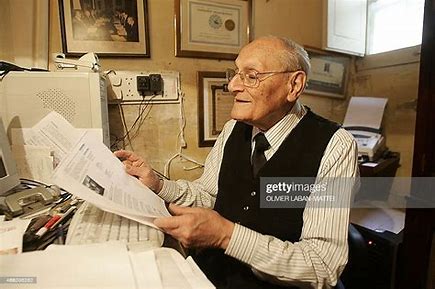
Onderschrift
We kept in touch and many years later Dr. Tabone became President of the Republic of Malta. He invited me to the Palace where I received a VIP treatment. He reminded me of that visit and said that I did not look very happy when I left. At last I was able to clarify why and we had a good laugh about it together.
I still have sweet memories about this well loved eye doctor and politician. After he stepped down as President I was able to visit him again at his residence. He died at the venerable age of 98. When I pass his statue in Balluta I respectfully greet him.
NOTE: Dr. Tabone was not the first President of Malta who received me at the Palace. That was Miss Agatha Barbara. The last one was the present President Mr. George Vella last year. To make the list complete I was also received by Dr. Guido de Marco and dr. Eddie Fenech Adami. I am proud of this.
- My first trip to Gozo
(originally posted on Facebook, 24th April)
In those days Father Charles was making a popular tv-program called Djalogu. He invited me to join his crew and collected me very early in the morning from St. Paul’s Bay on the way to the ferry. I was surprised to see that the ferryboat originally had been in use in the province of Zeeland in my own country. There were still the original signs Dames and Heren to indicate the toilets.
In Gozo we went to the village of Xewkija, where a huge new church, dedicated to St. John the Baptist, was under construction: the purpose of the episode of the program. After morning mass we were treated to an elaborate English breakfast by the young and recently appointment parish priest.1st Paragraph, please click grey area to the right to select the image to publish.
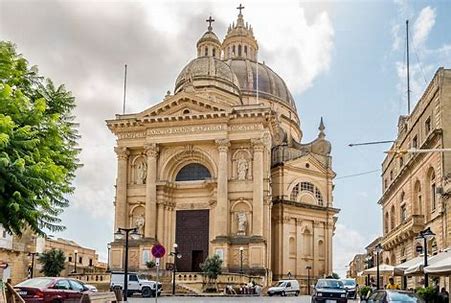
Onderschrift
While the tv-people were doing their job I was able to have a look around. I was impressed by the huge rotunda, but much more so by what was left of the beautiful previous church, which was pulled down during the building of its successor. I wondered if a village like this with some 2000 inhabitants really needed such a big church. Would it ever be completely filled with people? When I tried to discuss this with Dun Charles he immediately put me in front of a camera and asked me for my opinion. This was going to be my very first appearance on Maltese television.
After my opinion was transmitted I was told that my rather frank comment was not quite well received in Gozo, where feelings of proudness about the new Church prevailed over anything else.
I learned that Dutch frankness was not always appreciated in Malta. I had to polish my style and conversation, i.e. put on my Malta Cap.
If I were to understand Maltese society I’d better not start judging it by my own standards, but let people explain why they were acting as such. But some times I just had to ventilate my genuine feelings and I have been happy with a few good friends who did not blame me for calling a spade a spade.
- Getting accustomed
(originally posted on Facebook, 19th April 2023)
In the meantime we tried to get ourselves accustomed to living in Tal-Furi in particular and to Malta in general. Whenever there was time for a drive we would explore another part of the island. The children loved it when we would eat out. Especially The Wimpy (Valletta, Gzira or Sliema) was a favourite. I remember the strawberry milkshakes and the Knickerbocker Glory. We would like to shop in Sliema and even saw a Disney movie at the cinema there.
In restaurants we noticed that most people were very tolerant towards children, much more than we were used to. Almost everywhere there was a high chair available when we needed it. The atmosphere was relaxed and we felt most welcome. Soon we would add Kinnie to the drinks we liked.
We loved to go to the nearby Golden Bay Hotel where the pool and restaurant were open to non-residents.
In those days the British past was still very much present in eating and drinking habits. You could get a good cup of tea (with a lot of milk) almost everywhere, wile it was difficult to get a decent cup of coffee, with the exception of the Caffe Cordina in Valletta. On the menus you would often find curry and rice, often alongside with pasta dishes. In those days we were not too enthusiastic about the Maltese wines. They improved a lot, however, over the years.
One of the Maltese niceties was the local bread when it was fresh. I still like to eat it. It took a while before we got accustomed to the taste of gbnijiet, but now we love them. Maltese capers and olives (especially stuffed with anchovy) were also delicacies we started to appreciate. And we loved the small square pizza’s.
I still go for hobz biz-zejt and a small pizza as soon as I’ve arrived in Malta.
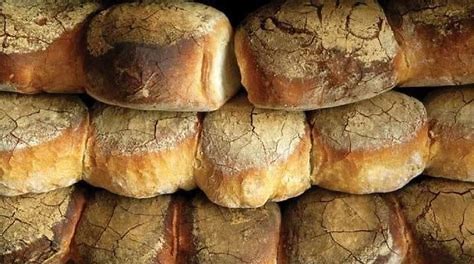
- My first procession
(originally posted on Facebook, 18th April 2023)
The very first procession I ever watched was Our Lady of Sorrows in Valletta on Friday 13th April. It amazed me many times and I took notes to remember everything later. The procession started from and ended in the church of Ta’Giesu. I did not know that the beautiful statue of Our Lady of Sorrows would also be carried around a week later, in the Good Friday procession.
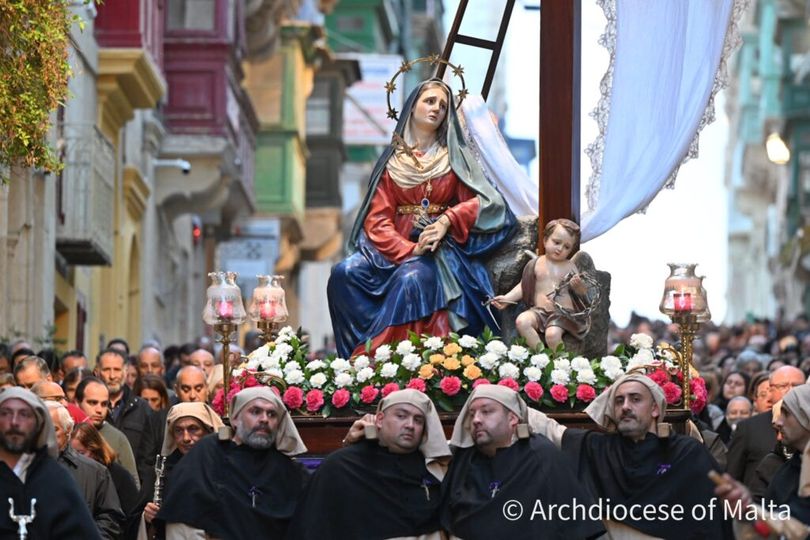
This photo is much more recent than 1973
The main celebrant was a very small and very old man. The next day I read in the newspaper this was Archbishop Michael Gonzi himself, a man who was going to be very important indeed in my studies. A large crowd followed the clergy, mainly women (quite a few barefooted) and old men (later some friends in Marsascala learned me rather naughthy Italian rhyme about old men returning to Church). Some prayed the rosary, others were happily chatting with each other. The procession, which stopped at each church they came across, was accompanied by the police.
- Getting to know the Church
Originally posted on Facebook, 13th April
I was supposed to study Church-State relations in Malta, but had hardly any knowledge about the Church I was going to study.
I was raised in a Protestant family in Rotterdam. My mother told me that, before she was married, she was employed as a pharmacist’s assistant. Her employer was a Catholic, ‘but a very good man’, she would always add. When I was twelve years old we spent our summer holidays in the province of Limburg, in those days a Catholic stronghold. I still remember someone telling to me: ‘If you were born here and not in Rotterdam, you would have been a Catholic just like us’ and that sentence influenced me for life. I’ve always found the connection between believers much more relevant than their differences. However, I had a lot to learn about the Catholic Church in general and about the Maltese Catholic Church in particular. Dun Charles gave me a booklet we the order of Mass in English, which helped me to follow mass in Maltese. I learned my first Maltese words in mass.
Two years later Father Joseph Carabott, parish priest of Marsascala, started teaching me ‘everything’ in the sacristy of St. Anne’s parish church on warm afternoons during siesta time.
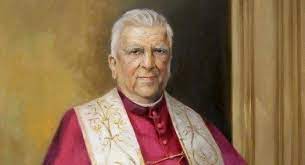
Father Joe became a lifelong friend. I was present at his installation as Archpriest of Siggiewi and later as Archpriest of Mosta too (in which he came from the altar and embraced me). Finally he became a Monsignor. In spite of his dementia he always recognized me when I visited him at Dar tal-Kleru, where he spent the last years of his life. I tried to find his grave near the old parish church of Zejtun, in vain unfortunately.
I must admit that, as a non-Catholic I have always felt very welcome in the Maltese Roman Catholic Church.
- Our oldest friends
(originally posted on Facebook, 11th April 2023)
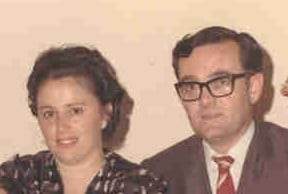
On 8th April we got a visit from Marion and Edgar Causon. I had phoned them up after our arrival as we had mutual Dutch friends. It was the beginning of a lifelong friendship. Both were very much interested in my research. From then on I was always welcome at their home in Paola. We laughed a lot together. I always felt at home there.
Some day I started talking about some remarkable experience as soon as I entered their door (In many Maltese homes the door is always open). When I arrived in the kitchen I realized, however, I had entered the wrong home. The neighbours were much surprised. Later we laughed our heads off.
As a researcher often you cannot show the back of your tongue. With the Causons I could relax and should not always be on guard. I am still grateful to them.
Edgar was Manager of the Lybian Trade Co in those days and I quite often visited him in his office in Floriana, where I was always treated to a cup of tea by his cheerful secretary Doris. Edgar soon introduced me to his cousin Emmanuel Attard Bezzina, the Speaker of the House of Representatives. Marion and her sisters were very keen Catholics and liked to discuss the many priests and feasts on the islands. For me very valuable information.
Later Edgar would read later read several of my research reports and I thoroughly appreciated his comments. I was rather sceptical about his countrymen. I remember him saying: ‘Independent intellectuals over here are either shouted down or ignored’.
- Easter
(originally posted on Facebook, 9th April 2023)
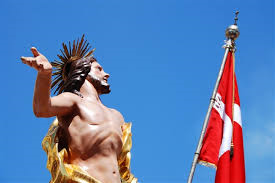
There are many Easter processions in Malta, but I love especially the ones in Cottonera, where they run with the statue of the Risen Christ and shout at their counterparts in the rivalling town.
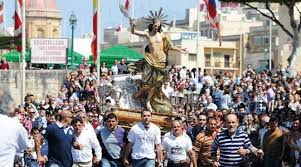
For the Dutch: a kind of Feyenoord-Ajax, but much less violent, although sometimes there are a few blows.
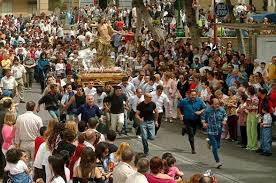

- Figolli
(originally posted on Facebook, 8th April 2023)
Thinking about the Maltese figolli makes me very nostalgic
From Wikipedia, the free encyclopedia
Figolla is a Maltese pastry stuffed with a marzipan-like filling and served as an Easter sweet.[1][2][3] These are often shaped like hearts, crosses, stars, fish, bunnies, any symbol which links to Christianity, particularly Catholicism, but in modern times these can be shaped into anything the person you give one to is passionate about.
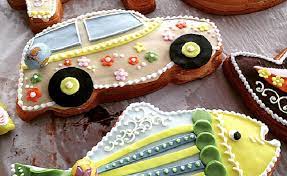
The biscuit base is predominantly made of plain flour, butter/margarine, caster sugar, vanilla essence, eggs, lemon rind and water.
The marzipan-like filling is made of ground almonds, caster sugar, egg whites, and almond essence. Some may also add orange rind or more lemon.
Figolli are generally topped with sugar icing or melted chocolate with hundreds-and-thousands on top.
In Malta, these are baked during Holy Week in the Catholic denomination of Christianity, and given to children/close family or friends to be eaten on Easter Sunday. Some Maltese villages have a tradition where the Figolli are blessed by a priest in the Pjazza outside the church along with modern chocolate Easter Eggs.
Figolli (plural of figolla) are thought to have Ancient Sicilian roots as the word comes from the Sicilian word ‘figulina’ meaning figure. These were also baked for religious purposes and also for victory against invaders such as the Turks who were also made to be figures also in remembrance of those events. These figulina baked in Ancient Sicily, are not as popular in Sicily in modern times, but have stayed and evolved in Malta.
- Good Friday
(originally posted on Facebook, 7th April 2023)
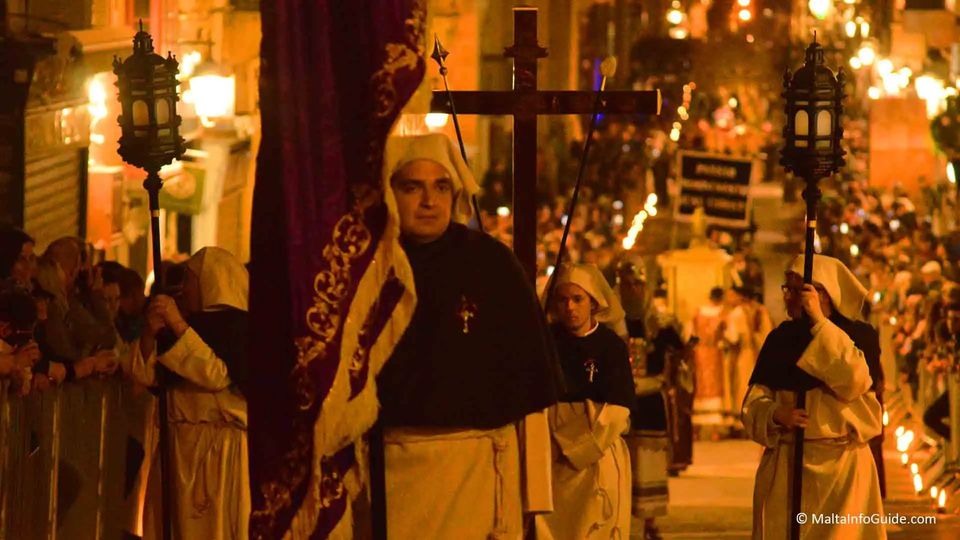
I have visited Good Friday Processions all over Malta. Zejtun, Zebbug, Cospicua, Vittiriosa, Senglea, Valletta, Rabat. The most pompous one was Qormi. The one I liked most was Luqa.
- Maundy Thursday
- Malta in 1973
(originally posted on Facebook, 4 and 5 th April 2023)
In 1973 Malta was an independent country with the British Queen Elizabeth II as Head of State. She was represented locally by a Maltese Governor-General.

Father Charles’ advice
I started my research a few days later at Dun Charles’ office as Director of the Cana Movement on the fourth floor of the Catholic Institute in Floriana. I have been so many times to that place. Fr. Vella was always very busy and in the meantime he started bossing me around and to my surprise I enjoyed it. I also met Father Louis Camilleri, the Deputy Director, always in a good mood. Het lived ‘far away’ in Hal-Dingli, a place where I was going to enjoy the festa in due time.
From the beginning Father Charles was very much interested in my studies. He lectured me for two hours on Malta, the Church, the State, the Cana Movement and everything ‘I needed to know’.
During one of our first meetings he gave me a numbered list of 26 persons I should interview. I still have this list, written in green ink. I could mention Father Charles’ name to most of them. In his opinion I should explore the backgrounds of Church-State relations, such as the Demech case and the Strickland affair. Therefore I should interview political oldtimers. His advice: ‘don’t go waste your time with youngsters who have their information from others. Go for first-hand facts’.
NOTE : Those wo know Father Charles will notice that thephoto above was certainly not taken in 1973, but many years later after het was made a Monsignor.
In the meantime we started exploring the island by car and by foot. I bought a road map and we drove to the utmost north from where we could see Gozo and Comino. On the way back we had a great meal at The Hilltop in Mellieha, a restaurant we would often frequent after we settled down in St. Paul’s Bay.
In the utmost south we enjoyed the picturesque fishing village of Marsaxlokk. We had to go the national phone office in St. Julians in order to tell our parents about our travelling to and arrive in Malta.
We were often amazed by our first impressions of Mdina and Rabat, Dingli Cliffs, the three Cities and places like Zabbar, Siggiewi, Zebbug and Qormi. During this and later stays we would love to have a drive over the island and stop somewhere for a walk. All of us really enjoyed Malta. Margreet and the children like several well kept playgrounds all over the island.
I loved to take the family (my wife Margreet and our children Jetty 2,5 and Corneel 1+) with me as much as I could. We stayed about a week in Sliema, where we enjoyed the sunny weather, not too hot (we came from the cold). Although we enjoyed our daily walks with the children near the sea we were not so fond of climbing all these stairs to our flat, so we decided to look for a more suitable accommodation. I still remember us checking a dark place in Rabat owned by a man, who said he was a nephew of the Archbishop. Margreet always had the last say, which was no in this case.
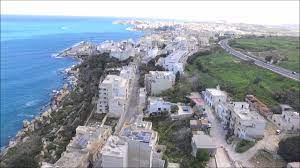
I cannot remember how we met Mr. John Mallia who became our landlord at Tal-Fjuri in St. Paul’s Bay. We stayed at the ground floor of his summer residence, his family living on top of us. It was a nice place with hardly any traffic, so the children could safely play around the house. We had a beautiful view on the village, Xemxija on the other side and the sea.
For me an extra asset was Mr. Mallia’s son Louis, a keen observer of the local political scene, who gave me precious information during the first years of my research. Unfortunately for me he emigrated later to Australia, of all places.
- Our first day in Malta
(originally posted on Facebook, 3rd April 2023)
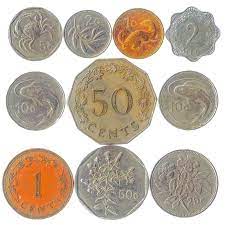
The next day, Saturday 7th April, I bought my first copy of The Times of Malta in a small shop on Tower Road. I wonder if it is still there. We had to make ourselves familiar with the recently introduced Malta pound or lira (Lm), which was divided into 100 cents, each of 10 mils. We found these mil coins quite peculiar. I was amazed to hear Maltese mothers shouting to their children in English.
In the afternoon we drove to Valletta. We parked the car in Floriana, another town but quite close. We saw a beautiful fountain and an ugly City Gate. We were impressed by the main street, Kingsway, with its many shops. Among them Sapienza’s Bookshop, which I was going to visit many times in the forthcoming years.
We had a glimpse at the impressing St. John’s Co-cathedral, where we saw two thrones near the altar and enjoyed ourselves in the Upper Baracca Gardens. Overwhelmed with impressions we drove back to Sliema and ate dendici (another first time) at the Meadowbank Hotel, quite near to ‘our’ apartment.
- Our first arrival in Malta, now 50 years ago
(originally posted on Facebook, 2nd April 2023)
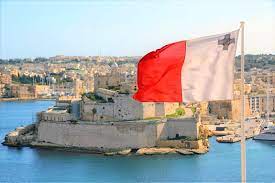
I became interested in Malta in the late sixties of the previous century. After I managed to get a small research grant we (my wife, our two children and me) drove in early April 1973 overland in five days via Belgium, France and Italy to Siracusa, where we took the ferry to Malta.
It was already dark on Friday 6th April, the ferry-boat from Sicily has been at sea for hours. Then, suddenly. lights were seen. Within half an hour the boat was tied to the quay at Malta’s Grand Harbour; it was 10 o’clock p.m. A few immigration officers embarked. Since I had filled in a disembarkation card, I expected to be off the boat soon. But the officers wanted to ask everybody personally what their business was going to be in Malta and how long they intended to stay. That took a long time, especially because our family passports were not kept together. After I was handed back our stamped passports I drove the car off the boat.
Dun Charles Vella (ta’ Cana), who I met in Amsterdam a few months before, was waiting at the quay for us. He wriggled himself into our fully packed Volvo Amazone, told me to drive on the left and coached me towards his flat in Amery Street, Sliema. There he had made an apartment available for us on top of his own. There was coffee, tea, lemonade, bread, butter, sugar, cheese and other necessary things for all of us.
After we had unpacked the car and put the children to bed he poured me a glass of whiskey, the first I ever drank. It was a great welcome to Malta.
